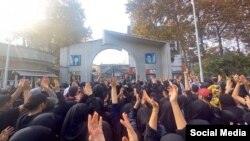"I call on the authorities immediately to stop using violence and harassment against peaceful protesters," said Volker Turk, the United Nations' high commissioner for human rights.
"The unnecessary and disproportionate use of force must come to an end," he said, warning that Iran was in "a full-fledged human rights crisis."
Turk opened an emergency session of the UN Human Rights Council, where countries were called to discuss Iran's "deteriorating human rights situation" and determine if a high-level international investigation is warranted.
The meeting, requested by Germany and Iceland with the backing of more than 50 countries, follows two months of protests in Iran sparked by the death of 22-year-old Mahsa Amini, after she was arrested for an alleged breach of the country's strict dress rules for women based on Islamic sharia law.
"Accountability is a key ingredient of the pursuit of justice for human rights violations," he told the 47-member council, urging the body to vote in favor of an investigation.
"The security forces... have used live ammunition, birdshot and other metal pellets, tear gas and batons," said Turk.
He also said around 14,000 people, including children, have been arrested in the context of the protests, describing this as "a staggering number".
At least six people have so far been sentenced to death in connection with the protests.
German Foreign Minister Annalena Baerbock, who like her Icelandic counterpart attended the session, stressed that "the Iranian demonstrators have no seat at the Human Rights Council in Geneva."
Before it began, she urged the council to "raise its voice for the indivisible rights of Iran's people."
Diplomats and rights activists voiced strong support for the initiative.
"We must do all we can to expose the truth of what is happening inside Iran and support the calls of the Iranian people for justice and accountability," US ambassador Michele Taylor said.
In response, Khadijeh Karimi, Iran's deputy of the vice president for women and family affairs, slammed the Western countries that demanded the meeting.
Europe and the United States "lack the moral credibility to preach others on human rights and to request a special session on Iran," she said.
Germany and Iceland received broad backing for their request to hold Thursday's session, including from more than a third of the council's 47 members.
Western diplomats voiced cautious optimism that the resolution would go through but acknowledged it could be tight.




